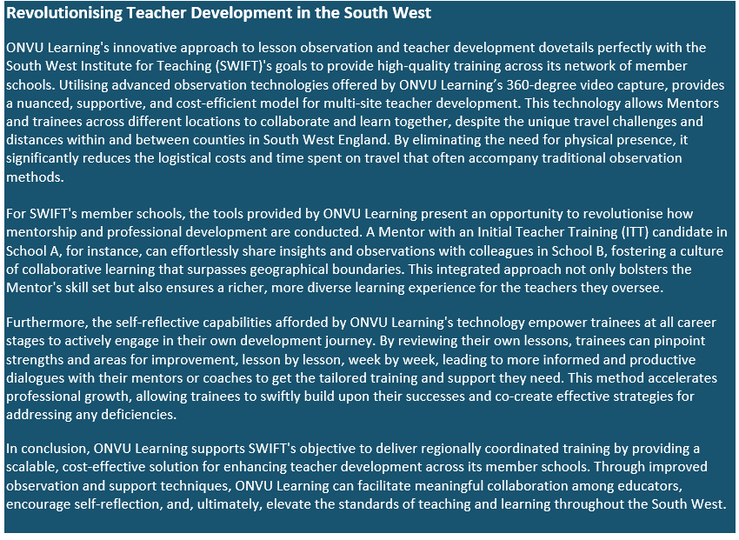|
Lesson observations have long been a cornerstone for teacher development and student achievement. However, the traditional approach to observations has often been met with apprehension and can sometimes be viewed as a critique rather than a constructive process. Matt Tiplin, VP Commercial of SWIFT sponsor, ONVU Learning, has extensive experience as a senior leader in a Multi Academy Trust (MAT) School and Ofsted inspector, and proposes here a re-evaluation of these practices to foster an environment of support rather than scrutiny. The Issues of Traditional Observation Methods Lesson observations, in their current form, tend to focus more on the teacher's delivery method rather than the impact of these methods on student learning. Matt, reflecting on his own experiences both as an observer and as a teacher, acknowledges the limitations of this approach. He argues that a shift towards a more supportive and low-stakes observation process could significantly benefit teachers and, by extension, their students. Limitations of One-Off Observations The traditional model of one-off termly observations has been criticised for leaving teachers feeling unsupported and overly scrutinised; as this method, which often emphasises the observer's preconceptions of what constitutes 'good' teaching, can overlook the effectiveness of the teacher's approach and its impact on student learning. Matt recalls an instance where his feedback focused on a teacher's style rather than the content delivery's effectiveness, highlighting the need for observers to consider the diversity of teaching methods and their respective outcomes. Understanding the Context of Learning Furthermore, Matt discusses the importance of understanding the context in which a lesson takes place. He emphasises that learning is not a one-off event but a series of interconnected experiences. Consequently, observations should not be isolated snapshots but part of a broader assessment of teaching and learning processes. This perspective challenges the conventional wisdom that a single observation can accurately reflect a teacher's impact on their students' learning journey. The presence of an observer can also influence the classroom dynamics, a phenomenon known as the Hawthorne Effect. A New Model for Lesson Observations To address these issues, Matt advocates for a more nuanced approach to lesson observations. He suggests that observations should be more frequent and formative, focusing on what students are learning over a series of lessons rather than a single classroom session. This approach encourages a dialogue between the observer and the teacher, where both parties can discuss the lesson's objectives and the expected outcomes. By doing so, the observation becomes a collaborative process, with the observer's role shifting from a judge to a partner in the teacher's professional development. Empowering Teachers through Self-Reflection and Technology Moreover, Matt highlights the value of self-reflection and the use of technology, such as discreet cameras, to allow teachers to review their lessons and identify areas for improvement – week by week. This self-directed learning in which teachers are in full control of the video footage empowers teachers to take ownership of their professional growth, making the observation process a tool for enhancement rather than evaluation. Conclusion: A New Approach to Lesson Observations The insights shared by Matt Tiplin on rethinking lesson observations find a strong resonance with the findings of the Institute for Public Policy Research (IPPR) in their "Improvement through Empowerment" report. Both advocate for a transformation in the traditional methodologies of classroom observation, emphasising the need for a more supportive, nuanced, and context-aware approach. Matt's reflections and suggestions offer a blueprint for rethinking lesson observations. By adopting a supportive, low-stakes approach that emphasises collaboration, context, and continuous learning, educators can transform observations into opportunities for genuine growth. This paradigm shift, rooted in mutual understanding and respect, has the potential to enrich the teaching profession and enhance educational outcomes for students. Engage with the Future of Education | Upcoming SWIFT Events with ONVU Learning If you are interested in delving deeper into the transformative approaches to lesson observations and teacher CPD as discussed here by Matt Tiplin, you will have a unique opportunity to engage directly with the ideas. Keep an eye out for an upcoming webinar from ONVU Learning on "Excellent Teachers create Excellent Memories," where Matt will be sharing his insights and experiences. You will have an opportunity to connect with ONVU Learning at the SWIFT Summer Conference on Thursday 13 June 2024.  By Matt Tiplin, VP Commercial, ONVU Learning Matt Tiplin is a Founding Fellow of the Chartered College of Teaching (FCCT), Former Ofsted HMI, Secondary School, MAT Leader, and Geography Teacher. He is also currently the Chair of Governors of a Community Primary School and the VP of ONVU Learning.
0 Comments
Your comment will be posted after it is approved.
Leave a Reply. |
SWIFT News
|
SPONSORED BY
Join us, be a part of our SWIFT community |
© COPYRIGHT 2022 SOUTH WEST INSTITUTE FOR TEACHING SWIFT. ALL RIGHTS RESERVED | Website by brightblueC
VIEW OUR PRIVACY NOTICES | VIEW OUR COURSE T&CS
VIEW OUR PRIVACY NOTICES | VIEW OUR COURSE T&CS




 RSS Feed
RSS Feed





